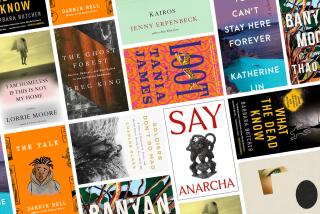DISCOVERIES
- Share via
A Hero of Our Time
A Novel
Mikhail Lermontov
Translated from the Russian
by Marian Schwartz
Modern Library: 166 pp.,
$11.95 paper
“I am foolishly made,” thinks Pechorin, soldier, lover, the very embodiment of youth and vigor. “There is not a man on earth over whom events acquire such power as me. Any mention of a past sorrow or joy strikes painfully at my soul and extracts from it the very same sounds.” And yet it is hard to imagine a character in literature more finely trained for causing women pain. As in “Les Liasons Dangereuses,” love, in Mikhail Lermontov’s only novel, written a year before he died in 1841 at 26, is just a game. Lermontov was banished to the Caucasus in 1937, after writing a poem blaming poet Alexander Pushkin’s death (in a duel) on corrupt Russian society. He, too, was killed in a duel after insulting an ex-mayor of Moscow (whom he called “a highlander with a big dagger”).
The finest passages are descriptions of the Caucasus, of mountains, pale moons, black clouds and fine rain. Pechorin is a handsome, coldhearted yet passionate man with a keen contempt for society and hierarchy of any kind, including military. Lermontov captures some of the fire that burns him to ash. He is, writes the author in his preface, “a portrait composed of the sins of our entire generation in full flower.”
*
Gaspard de la Nuit
A Collection
Aloysius Bertrand
Adapted and translated by Donald
Sidney-Fryer
Black Coat Press: 230 pp.,
$39.95 collector’s edition
$20.95 paper
“Childhood and poetry! How the one is ephemeral and the other is delusive! Childhood is a butterfly that hurries to burn its pure wings in the flames of adolescence, and poetry is like the almond tree: its flowers breathe perfume but its fruits taste bitter,” wrote Aloysius Bertrand, a sensitive, sickly, impoverished young man who died in 1841 of tuberculosis at 34 in a charity hospital in Dijon, France. “Gaspard de la Nuit” is Bertrand’s collection of prose poems that captures various places, dreams and fantasies, from visions of Old Paris to thoughts on “The Five Digits of the Hand.”
These pieces are not read so much as opened, unlocking sounds and colors and creatures the reader could only imagine: “the watercress that shelters the frozen salamanders”; “the funereal moan of the grebe”; and “the caverns deep underground at Asnieres, where the stalactite distills with deliberation that eternal drop of moisture in the waterlock of centuries.” The book is nothing less than an antidote for a flagging imagination, with words that are, in Bertrand’s hands, transporting: mandolin, linen, pheasant, hops, philistine and halberdier. Bertrand, much loved by Victor Hugo and the critic Sainte-Beuve, became posthumously a kind of cult figure in European literature. He suffered for his art in his lifetime. What is written here did not come easily; it has the ring of deep ore. There is not a hollow phrase throughout.
*
Pure Pagan
Seven Centuries of Greek
Poems and Fragments
Selected and translated
by Burton Raffel
Modern Library: 82 pp., $17.95
What could be more alluring, midsummer, than such a title as “Pure Pagan”? Think warm fruit, wine and these phrases: “Young men’s spears and sweet clear songs” (Terpander, mid-7th century BC); “a city blossoming with freedom” (Simonides, 5th century BC); “Hear the sweet breeze in its green leaves” (Anyte, early 3rd century BC). Dionysios of Andros wrote in no-one-knows-what century: “No wonder I slipped, and fell, and died, / Soaked by Zeus outside, / Soaked by Bacchus within. / The odds were two to one / And they were gods.” Let that be a warning to sun worshippers, vacationers. These were poems, writes Guy Davenport in his introduction, read at dinner parties in which the guests reclined on the floor, resting on their left arms and eating with their right. A cup of wine went round the room, and “emotion flowed from shoulder to shoulder.”
More to Read
Sign up for our Book Club newsletter
Get the latest news, events and more from the Los Angeles Times Book Club, and help us get L.A. reading and talking.
You may occasionally receive promotional content from the Los Angeles Times.










